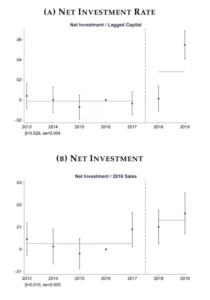This article was originally published in the National Review.
By Jon Hartley, November 29, 2023
It’s been almost six years since the Tax Cuts and Jobs Act became effective on January 1, 2018, and slashed the corporate-tax rate from 35 to 21 percent.
Back when the legislation was being debated, there were heated arguments about what the levels of corporate-tax rates should be, which were then the highest in the OECD. Advocates, including me, argued that tax cuts would play an important role in reducing the cost of capital for firms, thus boosting fixed investment and the capital stock, which are important components of economic growth. Economists Jason Furman and Robert Barro were more skeptical, projecting only meager productivity gains from the tax cuts. Progressive leftists argued the corporate-tax cuts would lead only to lost tax revenue, with no compensating productivity benefits whatsoever.
But here we are six years later, and evidence is starting to pile up from independent economists whose analyses find that the corporate-tax cuts from the Tax Cuts and Jobs Act had a meaningful, positive effect on fixed investment.
Patrick Kennedy, an assistant professor at the University of Chicago who has access to IRS micro-data of firms (alongside co-authors Christine Dobridge, Paul Landefeld, and Jake Mortenson), compares C-Corps who received the corporate-tax cuts to S-Corps who did not receive as substantial of a tax cut. The increases in fixed capital investment (think purchases of plant, property, and equipment), along with increased hiring following the tax cuts, resulted in “reductions in marginal income tax rates cause increases in sales, profits, investment, and employment, with responses driven by firms in capital-intensive industries.” Corporate-tax cuts mean increased hiring of individuals, including those below the median income. In this light, corporate-tax cuts can be viewed as an anti-poverty, pro-worker policy.
Average Difference Between C-Corp Versus S-Corp Employment and Payroll After Tax Cuts and Jobs Act

(Source: Patrick Kennedy, Christine Dobridge, Paul Landefeld, and Jake Mortenson)
Average Difference Between C-Corp Versus S-Corp Fixed Net Investment After Tax Cuts and Jobs Act

(Source: Patrick Kennedy, Christine Dobridge, Paul Landefeld, and Jake Mortenson)
Another group of authors (Gabriel Chodorow-Reich of Harvard, Owen Zidar of Princeton, Eric Zwick of the University of Chicago, and Matthew Smith of the U.S. Treasury Department) with access to the same IRS data took a different approach to measuring how marginal tax rates and the user cost of capital changed across firms. They find that “TCJA caused domestic investment of firms with the mean tax change to increase by roughly 20 percent relative to firms experiencing no tax change.”
Both papers acknowledge that there were tax-revenue shortfalls. That being said, the Kennedy paper shows that the corporate-tax cuts have a high elasticity of taxable income (compared with other forms of taxation), which in layman’s terms means the more you tax something, the less additional revenue it raises. In other words, corporate tax is a more inefficient form of taxation compared with, say, individual-income taxes, partially because corporations are more mobile than individuals. This new academic analysis of the Tax Cuts and Jobs Act shows that revenues fell less than many commentators and even academics originally thought.
What does this mean going forward? One, that corporate-tax cuts successfully spurred investment and created jobs. Two, it suggests that the supposed global “race to the bottom” in terms of corporate-tax cuts would not be such a bad thing. To minimize distortions, the ideal corporate-income tax should be zero, while shareholders and individuals are taxed more.
Current Treasury secretary Janet Yellen, along, predictably, with the EU and other usual suspects, are trying to constrain international tax competition by creating a global minimum corporate tax. The original OECD agreement, signed by 136 countries in 2021, creates a global, minimum 15 percent effective corporate tax to a defined corporate-income base worldwide. The OECD agreement says the global minimum tax “does not seek to eliminate tax competition, but puts multilaterally agreed limitations on it.” One objective, however, is to discourage profit-shifting to countries that are deemed too competitive. Equally, if implemented, it would represent an international-law obstacle to the ability of voters in one of the signatory countries from opting for a lower tax regime.
Originally meant to take place in 2023, the tax arrangement has now been delayed until 2024. Countries that don’t comply with this system would effectively (thanks to the way that profits of multinationals located there would be taxed) lose much of the competitive advantage they currently enjoy under their lower-tax regimes by forcing foreign firms to make up for it in paying retributive taxes. As of now, it appears the U.S. Congress (House and Senate) will not sign such a minimum corporate tax, just like any tax or spending bill.
The effort to establish a minimum global tax is another reminder of how hard it is to argue that Secretary Yellen supports pro-growth corporate-tax policies, despite the positive effect they would have on investments and job creation (often for workers below the median income). Coupled with many of the tax-cut provisions for individuals that expire in 2025 (and the Democrats have no interest in keeping), it may be some time before we can look for further reduction in the distortions from taxation. But we can be at least grateful that the TCJA corporate-tax cuts at 21 percent are permanent — well, at least for now.
Jon Hartley is a senior fellow at the Macdonald-Laurier Institute and a Research Fellow at the Foundation for Research on Equal Opportunity.








